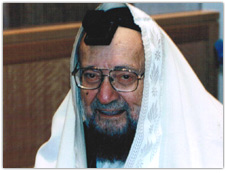 We Were the Lucky Ones
We Were the Lucky Ones


7 min read
My father's story of good and evil, despair and open miracle, and simple human kindness.
I sat as close to my father as I could, with pen and paper in hand. My father, a prisoner trapped in a body stricken with an unforgiving regressive illness, could only speak in a strained whisper. The story he wanted to be told was about his father, my grandfather, a story of good and evil, despair and open miracle, the depths mankind can sink to and simple human kindness.
 Looking at my father's emaciated form lying helplessly in his hospital bed, it seems as if the disease has won, but anyone who has seen his beautiful smile knows the truth. My father's story and his father’s story are both about struggle and triumph. It took him two hours to dictate the story that is our family legacy to me.
Looking at my father's emaciated form lying helplessly in his hospital bed, it seems as if the disease has won, but anyone who has seen his beautiful smile knows the truth. My father's story and his father’s story are both about struggle and triumph. It took him two hours to dictate the story that is our family legacy to me.
“Zeidy’s uncle was a carpenter,” he began, “and Zeidy apprenticed under him. Then the war broke out. He was still just an apprentice, but when the Germans asked for skilled craftsmen, Zeidy raised his hand. Because of his training, he was sent to a work camp instead of a death camp, located in Tanapole, Ukraine. The project of the camp was to build retirement homes for the German officers for after the war.
"If you ever get out of this place, come find me. I can hide you."
“At the camp there was one watchman who took a liking to Zeidy. It might have had something to do with the fact that Zeidy found a way to get cigarettes to him. Zeidy figured that to have a watchman as a friend in a place like this would be a good thing. He was right, but it would be a while before that friendship came into play.”
“One day, as Zeidy was working by the fence surrounding the camp, a woman he had never seen before sidled up to the other side with studied casualness. In a whisper she said, 'If you ever get out of this place, come find me. I can hide you. Here -- take my address.' And then she was gone. The whole exchange happened so quickly he might have imagined it, if not for the piece of paper that he held in his hand. He quickly memorized the address and destroyed the paper.
“A couple of days later, when Zeidy was walking back alone to his barracks late one night, he overheard a discussion between the camp commandant and someone else. They were discussing the technical details involved in their plan to liquidate the camp.
“With nothing to lose, Zeidy made an instantaneous decision. He knew that there was one section of the fence surrounding the camp that was not watched frequently. He also knew that on the other side of the fence was a sewer canal. Quietly, and without a second thought, Zeidy made for that section of fence and climbed over. He went straight into the sewer.
“He wasn’t sure what his next move should be, so he sat there, in the waste, gagging from the overwhelming stench. Then he heard the unmistakable sound of someone entering the sewer. Zeidy froze, heart pounding, as someone sloshed through the muck towards him. As it came closer, he recognized the figure as a fellow inmate.”
“’What are you doing here?’ Zeidy asked in astonishment.
“’I saw you jump over the fence and into the sewer. I didn’t think about it. I just followed,’ the man said.
The sound of running and screaming overhead was heard by the two fugitives. The liquidation of the camp had begun.
“Zeidy was glad for the company, and since the man had a watch, a gold watch that he had managed to hide in the camp against all odds, he was also glad they would be able to tell what time it was. That night, the sound of running and screaming overhead was heard by the two fugitives. The liquidation of the camp had begun.
“A couple of days passed. They stayed in the sewer. Zeidy wanted to stay there for a while until he was sure that it was all over. Obviously this was a difficult thing to do. The sewers were filled with waste, and claustrophobically narrow. The men also had nothing to eat. Finally, it was all too much for Zeidy’s companion. He needed to get out. He needed to get out now.”
My own heart pounded as I scribbled these words, picturing the fear, the panic, not knowing what to do. "What happened? Did he leave? Did they both leave?”
“Zeidy pleaded with him not to go, but he said that he was going to go up anyway. He had to. As soon as he went up, Zeidy heard a shout. 'Achtung!' and then the same voice yelling at his companion to take off his watch. There was a pause, maybe as the man fumbled to do as asked. Then a single shot. And then two voices, arguing in German over who would be the one to descend into the sewer to see if there were any more escaped prisoners.
“But neither would. Neither wanted to get dirty. Instead, the Germans emptied their machine guns into the sewer. Zeidy protected himself by hiding behind a cement pillar and listened to the bullets zoom harmlessly past him. After an eternity, he heard their footsteps fading overhead, and Zeidy figured he had better move on. He trudged through the sewer in a straight line, until he came to the end.
“Covered from head to toe in waste, Zeidy emerged, blinking in the sunlight. He found himself in an unfamiliar countryside. He stumbled around for a while until he saw a girl. Zeidy asked her for something to drink and a change of clothing, but she took one look at Zeidy and started to scream and run away. With equal panic at who she might find to tell on him, Zeidy ran the other way and almost barreled straight into a man walking towards him. It was the watchman from the camp! He was now out of a job since the camp had been liquidated. He gave Zeidy something to eat and drink, and a change of clothing.”
“To bump into the watchman, of all people, what are the chances…?” I said, almost to myself. My father smiled faintly.
“And then, hoping against hope, Zeidy told him the address of the woman who had whispered to him at the fence and asked the watchman if he knew where to find the house. It turned out that the house was only a few minutes away, and the woman, true to her word, took him in and hid him for almost a year, until the Russians came.
“Jews liberated by the Russians were not always out of the woods yet. Zeidy knew that he would have to find a way to make himself useful to them. He met two brothers who knew how to sew and were put to work sewing Russian uniforms. Being a quick study, he learned how to sew from them and sewed uniforms alongside them until he was sent to a DP camp. There, he met the sister of those two brothers. And as soon as a proper ketubah could be procured, he married her. She was, of course, your Bubby.”
I heard it said that if you want to get a blessing from a holy man, ask anyone you see who puts tefilin on over an arm that has a number tattooed on it. That man was my grandfather. And as I watch my brother putting tefilin on my father’s wasted arm, I cap my pen, touch his hand lightly, and ask my father for a blessing.
Inspiration derived from this story should be a merit for my grandfather’s neshama, Zev Yehuda ben Baruch, and a refuah shelaima for my father, Baruch ben Sarah Chasha.
